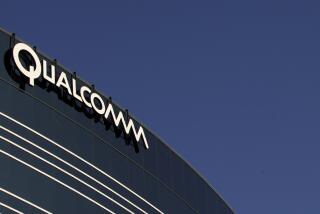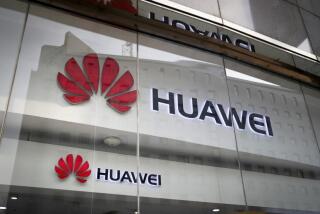SEC Might Sue Ex-Lucent Execs
- Share via
Lucent Technologies Inc., the biggest U.S. phone-equipment maker, said Monday that U.S. regulators might sue former Chief Executive Richard McGinn and two other ex-employees for allegedly making bribes to win business in Saudi Arabia.
McGinn, John Heindel, former head of Saudi Arabian operations, and a third former employee who wasn’t identified received so-called Wells notices from the Securities and Exchange Commission, Murray Hill, N.J.-based Lucent said in a regulatory filing.
The notices relate to a 15-month probe by the SEC and Department of Justice into possible violations of a law banning bribes to foreign officials. Neither the company nor any current employees have received notices, Lucent spokesman Bill Price said. The investigation continues, he said.
“You never like seeing ‘Wells notice’ and a company name in the same line, but we don’t see it having any material impact on Lucent’s ongoing operations,” said Tim Daubenspeck, an analyst at Pacific Crest Securities in Portland, Ore.
McGinn, who was pushed out by the company’s board in October 2000 after sales plummeted, did not immediately return a phone message left at his office. Heindel, reached at home, declined to comment. SEC spokesman John Heine declined to comment.
The alleged violations took place from 1997 to 2000, according to the SEC filing.
The bribe allegations are the basis of a pending lawsuit filed last year by Saudi Arabia-based National Group of Communications and Computers Ltd. The suit claims Lucent won favorable treatment from the nation’s telephone agency by paying more than $15 million in bribes to the office’s minister, Ali Johani.
The bribes were allegedly paid in the late 1990s as Lucent was bidding on a Saudi telecommunications expansion project worth billions of dollars, the National Group suit said. Saudi Telecom Co. ultimately awarded Lucent most of the work.
CEO Patricia Russo later ordered a company review of operations in 23 foreign countries. The review found possible bribery violations in the company’s Chinese unit. In April, Lucent fired the president of Chinese operations and three other executives.
The Foreign Corrupt Practices Act makes it a crime for a U.S. company to pay a foreign official to win or keep business. Violations can result in fines and prison time.
Shares of Lucent rose 7 cents to $3.65 on the New York Stock Exchange.
The shares had risen 29% this year.






